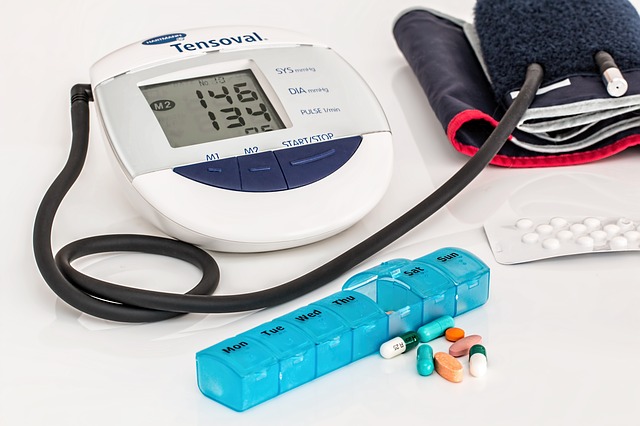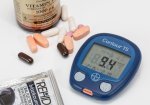Ibuprofen and High Blood Pressure Explained

Ibuprofen and high blood pressure association has been both confirmed and contradicted by credible studies. On one hand, ibuprofen has been shown to increase blood pressure in individuals living with hypertension. On the other hand, and interestingly so, high doses of ibuprofen taken over a certain period of time have not been proven to cause elevated blood pressure in normotensive individuals. Normotensive individuals are people with normal blood pressure.
Ibuprofen, also known in common street language as vitamin I, belongs to a class of painkiller medications known as non-steroidal anti-inflammatory drugs (NSAIDs). Other similar well known NSAIDs that you probably know of include aspirin, indomethacin also known as indocin, and celecoxib also known as celebrex, among others.
The fact that it is a non-prescription drug and available over-the-counter makes public awareness of the link between ibuprofen and high blood pressure a matter of great interest and importance.
A peer reviewed study published in BMC Cardiovascular Disorders, 2012, by BioMed Central put forward findings that NSAIDs such as ibuprofen caused, albeit to a small degree, elevated systolic blood pressure in individuals suffering from hypertension.
While the study report refereed to a 2 mm Hg increase in blood pressure as small, other studies have already shown that a slight change in blood pressure has tremendous consequences for cardiovascular disease (CVD) mortality and morbidity. What this means is that it is beneficial for any hypertensive individual to reduce their blood pressure numbers by any small margin possible to avoid possible cardiovascular damage.

Ibuprofen and high blood pressure medications
The BMC Cardiovascular Disorders published study revealed that the rise in systolic blood pressure among hypertensive individuals taking ibuprofen differed according to high blood pressure medication the respective individuals were administering.
People prescribed with betablockers, a hypertension class of medications, experienced the greatest increase in blood pressure compared to other high blood pressure medications. This increase was explained by a certain effect ibuprofen had on the sympathetic nervous system which controls blood vessel constriction. When blood vessels are constricted, the heart is forced to work harder to pump blood increasing blood pressure. This also partly explains how the heart, as an organ, gets damaged.
Learning from the results of this study, when intending to use ibuprofen it is important to consider your high blood pressure meds and how that medication may interact with ibuprofen resulting in elevated blood pressure or reduced efficiency of the antihypertensive drugs.
If the relationship between ibuprofen and high blood pressure meds is of serious importance to you, a study cited in the peer reviewed Anaesthesia, Pain & Intensive Care (APICARE) journal investigated high blood pressure drugs that were least affected by NSAIDs. Of the many drugs, calcium channel blockers (CCB) were thought to be less affected by NSAIDs both in their efficiency and efficacy.

Ibuprofen and high blood pressure in healthy people
While the BioMed Central study did prove the relationship between
ibuprofen and high blood pressure in hypertensive individuals, another
independent study published earlier in the Drug Intelligence &
Clinical Pharmacy journal in 1987 did not find any association between
ibuprofen and high blood pressure this time in people with normal blood
pressure numbers.
Researchers followed a group of 10 healthy
young women with normal blood pressure on a 24 hour basis measuring
their blood pressure readings at intervals. During the study, which
lasted some good 8 days, participants took no added salt to reduce any
confounding effects.
Researchers concluded that as much as 2400
mg per day of ibuprofen for up to seven days had no effect on blood
pressure numbers for individuals who had healthy blood pressure readings
and not hypertensive. Furthermore, details of the research also
revealed that no significant changes in systolic or diastolic blood
pressure numbers occurred in the group during the 24-hour period of
monitoring.
While this study seriously downplayed any association between ibuprofen and high blood pressure, a few things to keep in mind is that this was over a limited period of time of just over a week and also that the study was limited to a specific group, young women.
That said, the concern and focus across medical reports appears to be on high dose ibuprofen and its effect on blood pressure. In the European Union, for example, 1200 mg happens to be the highest dose available for over-the-counter drugs such as ibuprofen which are administered orally. It would appear lower doses of this NSAID should not cause concern. According to a May 2015 European Medicines Agency advisory, ibuprofen at doses of up to 1200 mg per day causes no increased cardiovascular risk.
Even so, some medical scientists have put forward that the increase in blood pressure as a result of the use of ibuprofen could actually be due to the NSAID itself, through competitive interaction, compromising the potency of whichever antihypertensive drug the individual would be taking. This possibly explains why normotensive individuals such as the group of ten young women did not have their blood pressure numbers rising despite administering a considerable dosage of ibuprofen.
To the best of our findings, the relationship between ibuprofen and high blood pressure still remains to be exhaustively investigated, suffice to say we do have some credible information to go by when making ibuprofen and blood pressure related decisions.

|
Alcohol and Blood Pressure |
Disclaimer
Information contained on this website is not meant to replace your doctor's advice.
(c) All Rights Reserved. 2010-2018
While ibuprofen is mostly commonly accessed over-the-counter, the following are some Nonsteroidal Anti-inflammatory Drugs available through prescription
- naproxen sodium
- piroxicam
- meloxicam
- naproxen
- diflunisal
- nabumetone
- meclofenamate
- fenoprofen
- oxaprozin
- meloxicam

You are probably interested to know how ibuprofen could influence your blood pressure or blood pressure medication. Did you know that calcium lowers blood pressure? Communities drinking hard water containing calcium and magnesium were shown to have low incidence of high blood pressure and consequently cardiovascular diseases. We prepared an insightful write-up of the relation between calcium and high blood pressure here

If you have ever been a bad winter season or if you have had an allergy you may probably have or know someone who has turned to Benadryl. While you may be here to learn more about the effect of ibuprofen on your blood pressure, you may want to also consider that Benadryl could also raise your blood pressure. We have done a full write-up here explaining how Benadryl could raise blood pressure.


